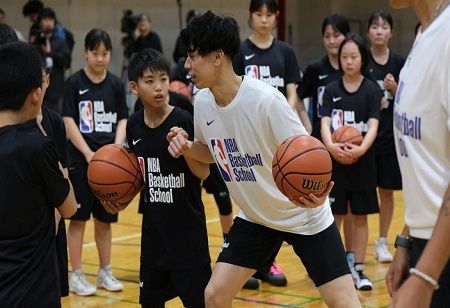The National Basketball Association is aiming to enhance its presence in Japan, a nation showing promising growth in the sport, by establishing a school focused on training young players. Taking inspiration from European and other professional soccer clubs, the NBA has launched the NBA Basketball School Japan. This program provides weekly one-hour lessons for individuals aged 5 to 18 at the Shibuya Junior and Senior High School gymnasium in Tokyo.
During the inaugural introductory session, 40 children were introduced to dribbling and other fundamental court skills. The curricula for the program's two levels of classes, influenced by the expertise of NBA coaches and athlete development specialists, are tailored to enhance the skills and court awareness of individual players rather than focusing solely on team dynamics. Prior to establishing its presence in Japan, the NBA had already launched basketball schools in 17 countries, including Australia, Brazil, and China.
Sheila Rasu, a senior NBA official responsible for fan acquisition and engagement in Asia, said basketball's popularity is rapidly growing in Japan, which will send both men’s and women’s teams to the Paris Olympics. She said Japan has a long relationship with the NBA, such as hosting preseason games, which makes the country a high priority for the league's strategy. Erutluc, a company that provides basketball lessons in the Tokyo metropolitan area, is cooperating with the NBA to train players at its school.
Prominent international soccer clubs such as Real Madrid from Spain, Paris Saint-Germain from France, and Boca Juniors from Argentina have launched training programs for young soccer enthusiasts in Japan. Barcelona FC from Spain initiated its Barca Academy in Fukuoka back in 2009, coinciding with the participation of Takefusa Kubo, a member of the Japanese national team, in one of its junior team camps. Currently, over 1,500 children aged between 5 and 15 are honing their skills at the six Barca Academy schools across Japan.
In 2017, Borussia Dortmund of Germany established its Dortmund Soccer Academy, inspired by the addition of former Japanese national team member Shinji Kagawa to the team in 2010. Presently, the academy boasts 900 registered players spread across 46 venues nationwide. Eijinho Yoshizaki, a writer well-versed in the soccer landscape of South Korea and other regions, noted that Japan has emerged as an appealing market for European and Latin American soccer clubs.
According to him, Japanese soccer enthusiasts exhibit openness to various playing styles, unlike in Southeast Asian nations like China and South Korea, where British Premier League clubs hold sway among European teams. Hideo Suzuki, a sports education professor at Edogawa University and a former J.League player, observed a transition in the primary venues for children's sports participation, moving from extracurricular clubs at junior high schools to community-based teams.
He said that the trend is giving business opportunities for overseas soccer clubs. “While children at foreign clubs’ schools can gain access to overseas coaching methods and information, that is not enough for them to grow as players,” Suzuki said. “The need for leaders who support them from a long-term perspective remains unchanged”.

